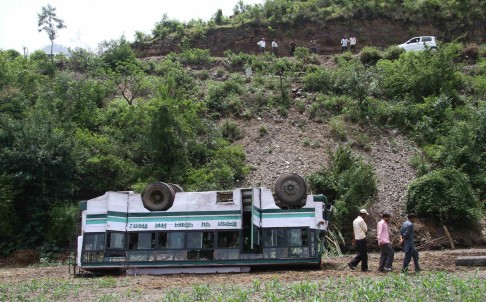Death every five minutes makes India's roads the world's deadliest
One person killed every five minutes on world's deadliest transport network, a toll projected to rise to one every three minutes by 2020
PUBLISHED : Tuesday, 15 July, 2014, 8:48pm
UPDATED : Wednesday, 16 July, 2014, 12:48am
Bloomberg in Mumbai

Untrained drivers, lax traffic-law enforcement and poorly designed roads are fuelling an epidemic of deaths on India's roads. Photo: Xinhua
Last month was a grim one on India's roads.
One of the country's top computer programmers died when he was hit by a speeding car. A policeman perished after allegedly being rammed by an irate driver. And a newly appointed member of Prime Minister Narendra Modi's cabinet was killed after a car crash left him with a ruptured liver and fractured spine.
The deaths illustrate the downside of the country's motorisation: its roads are the world's deadliest, with 15 per cent of global traffic fatalities and only 1 per cent of the motor vehicles, according to the World Bank.
Untrained drivers, lax traffic-law enforcement and poorly designed roads are fuelling the epidemic of deaths. One person dies on India's roads every five minutes, according to the World Health Organisation, a figure that's projected to rise to one every three minutes by 2020.
In 2012, the latest year for which data is available, 138,258 people died in road accidents in India, which had 159.5 million registered motor vehicles, according to the Ministry of Road Transport and Highways. That's more than four times the 33,561 fatalities in the US, with about 100 million more registered vehicles than India.
In mainland China, official statistics from the Ministry of Public Security showed 62,387 people died in road accidents in 2011. The WHO, however, estimates the actual annual figure could be almost double that.
It's getting worse as more people buy cars. The number of light vehicles sold annually in India is projected to climb to seven million in 2020 from 2.93 million in 2013, according to forecaster LMC Automotive.
The programmer, 32-year-old Harsha Suryanarayana, was walking home from a supermarket in Bangalore with his wife on June 15, when a car rammed into them, killing Suryanarayana on the spot. His wife, Neha, spent eight hours in intensive care. The driver of the vehicle that hit them hasn't been found, he said.
Gopinath Munde, 64, was appointed the country's rural development minister on May 26 in the wake of Modi's election. On June 3, the minister's car was hit by another car in New Delhi and Munde, who was in the back seat and wasn't wearing a seatbelt, suffered cardiac arrest after his injuries and blood loss, Health Minister Harsh Vardhan said.
India's infrastructure increases the risks. A majority of the country's highways are two-lane roads and lack pedestrian bridges or tunnels, according to Dinesh Mohan of the Transportation Research and Injury Prevention Programme at the Indian Institute of Technology in Delhi.
A bill to establish a board that would recommend standards for highway and vehicle safety and conduct audits lapsed after stalling in India's parliament for four years. As a result, India has no professionals in government who look at road safety, said Mohan.
B.K. Upadhayay, the joint commissioner of police for traffic in Mumbai, India's most populous city, said the government needed to enforce heavy penalties for traffic violations. Getting a driver's licence also needed to be more difficult, he said.
In the third incident last month, a driver in New Delhi hit and killed a policeman who was directing traffic. The 25-year-old policeman, identified as Constable Manaram, ended up on the bonnet of the car, which travelled 150 metres before he fell off, according to a statement from Delhi Police. The driver and occupants of the car were arrested.
The road-death epidemic shows a "complete disregard for the law", said Singh of the Indian Foundation of Transport Research and Training.
"People do what they want on the road because they're not afraid of getting caught, and even if they are caught, they can bribe their way out," Singh said. "We need to both train people properly as well as instil a fear of law."
